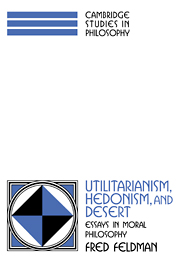Book contents
- Frontmatter
- Contents
- Acknowledgments
- Sources
- Introduction
- Part I Utilitarianism
- 1 World utilitarianism
- 2 On the extensional equivalence of simple and general utilitarianism
- 3 The principle of moral harmony
- 4 On the consistency of act- and motive-utilitarianism: A reply to Robert Adams
- Part II Hedonism
- Part III Desert
- Index of subjects
- Index of persons
- Index of cases
2 - On the extensional equivalence of simple and general utilitarianism
Published online by Cambridge University Press: 05 June 2012
- Frontmatter
- Contents
- Acknowledgments
- Sources
- Introduction
- Part I Utilitarianism
- 1 World utilitarianism
- 2 On the extensional equivalence of simple and general utilitarianism
- 3 The principle of moral harmony
- 4 On the consistency of act- and motive-utilitarianism: A reply to Robert Adams
- Part II Hedonism
- Part III Desert
- Index of subjects
- Index of persons
- Index of cases
Summary
INTRODUCTORY COMMENTS
Traditional forms of act utilitarianism were subjected to a variety of moral objections. Among these, two of the most important concerned examples involving promises and punishment. Objectors pointed out that if act utilitarianism were true, then it would be morally permissible to break a solemn promise whenever doing so would have even a tiny bit more utility than doing otherwise. They also pointed out that if act utilitarianism were true, then it would be morally permissible to punish an innocent victim whenever doing so would maximize utility. Particularly lurid and counterintuitive examples blossomed in the literature. These results were deeply disturbing.
Some utilitarians were moved by objections such as these to abandon act utilitarianism in favor of rule utilitarianism. They suggested that we go wrong in focusing on the utilities of individual acts and their individual alternatives. Instead, we should focus on the results of general or universal performance of acts relevantly like the ones in the original alternative set.
It was claimed that morally permissible acts are ones that have something like this feature: General performance of acts relevantly like them would have higher utility than general performance of acts relevantly like their alternatives. Such views were classified as forms of rule utilitarianism. Their advocates (including such luminaries as John Rawls in “Two Concepts of Rules”) claimed that these theories did not have the same offensive results as act utilitarianism.
- Type
- Chapter
- Information
- Utilitarianism, Hedonism, and DesertEssays in Moral Philosophy, pp. 36 - 46Publisher: Cambridge University PressPrint publication year: 1997

